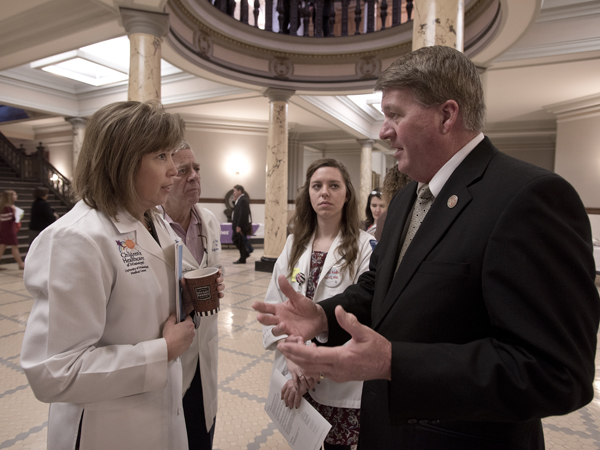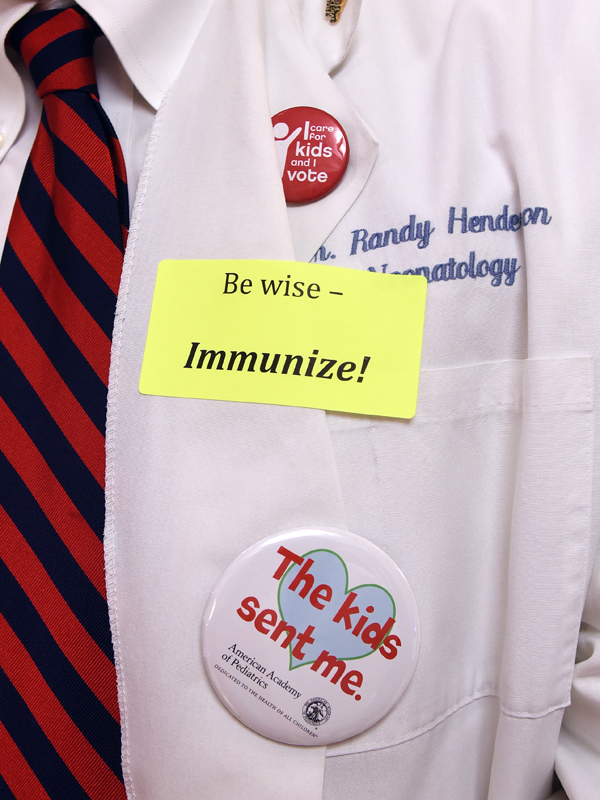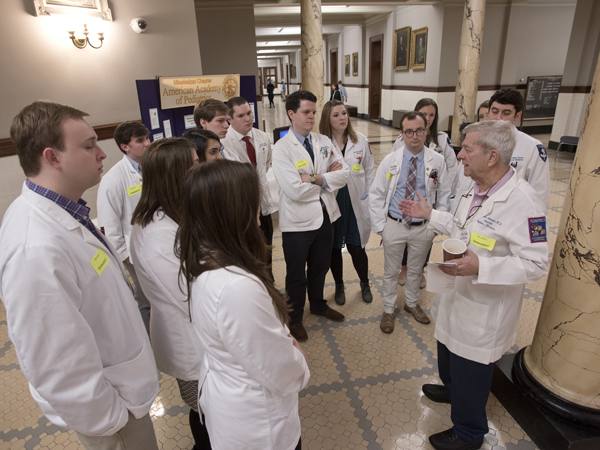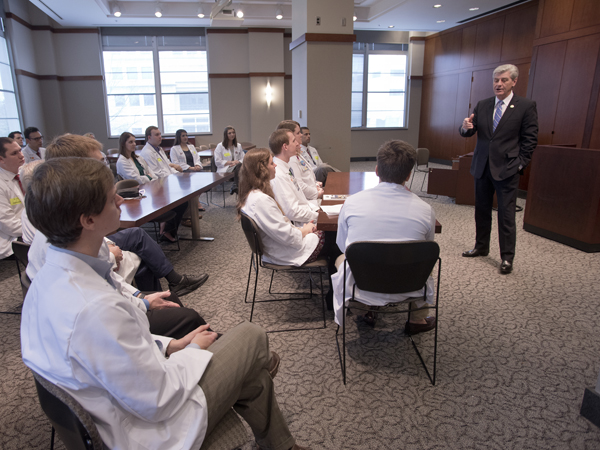Pediatric trainees, legislators share information during AAP Capitol Day

Published in News Stories on February 25, 2016
White-coated doctors, medical students, pediatric residents and fellows from the University of Mississippi Medical Center were getting a lesson in the inner workings of the Mississippi Legislature while sharing facts on health-related legislation Tuesday during the third annual Capitol Day, hosted by the Mississippi chapter of the American Academy of Pediatrics (MS-AAP).

The lapels of neonatologist Dr. Randy Henderson show his motivation at Capitol Day.
Their assignment came not from a medical school professor or the MS-AAP. Instead, the buttons pinned to the lapels of their coats said it all: “The kids sent me.”
“I'm here because I think it's really important to give a voice to kids to make sure they have a good start now for a better future,” said third-year medical student Ashton Walters.
About 20 medical students, pediatric residents and fellows joined pediatricians from around the state in sharing facts with legislators on a number of bills under consideration this session.
The pediatricians and trainees are most concerned about four bills filed this legislative session aimed at weakening Mississippi's vaccination laws. Currently, immunizations are required for school enrollment, with only medical exemptions allowed.
House Bill 938 would exempt students from required vaccinations by means of a certificate signed by a doctor and removes the requirement that exemptions be approved by the state Department of Health. The bill made it out of the House Education Committee Tuesday.
A similar bill in the Senate, SB 2722, and House Bills 939 and 979, which would have allowed for philosophical and religious exemptions to immunizations, all died in committee.
“Immunizations save lives and protect our children from debilitating diseases, expensive hospitalizations and death,” said Dr. Shawn Batlivala, a pediatric cardiologist at the University of Mississippi Medical Center. “Numerous scientific studies have demonstrated that vaccines are safe and effective.”
Said Dr. Sandor Feldman, retired chief of pediatric infectious diseases at UMMC: “Vaccines prevent deaths. Period. End of story.”

Feldman talks with medical students, residents and fellows at the start of Capitol Day.
Mississippi and West Virginia were the only states that disallowed nonmedical exemptions for immunizations for school enrollment, but after a 2015 measles outbreak in California, that state strengthened its laws following Mississippi's model.
Until recently, many preventable diseases such as measles and mumps, were thought to have been largely eradicated due to widespread immunizations. The U.S. had declared measles to be eliminated from the country in 2000. As immunization rates dipped in California, though, the disease made a return.
Mississippi physicians don't want to see the same thing happen here, Batlivala said.
Dr. Catherine Faulk, associate professor of pediatric emergency medicine at UMMC, said the state's last case of measles was in 1992, but noted the disease is a killer in other parts of the world. In 2014, about 145,000 died from measles worldwide.

Gov. Phil Bryant talks with UMMC medical students during Capitol Day Tuesday, encouraging them to practice in Mississippi and reach out to patients through the use of telehealth technology. Bryant and his wife, Deborah Bryant, are frequent visitors to Batson Children's Hospital, and he shared his vision for an expanding medical zone in Jackson.
Currently, Mississippi has one of the highest rates of immunizations among school children in the country. “We have one of the strongest vaccination laws in the country,” Batlivala said. “Leaders in California are seriously considering a move towards similar legislation. I am concerned that changing a law that's working and keeping children healthy is not a good move.”
To weaken the law, said third-year medical student Eric Merkle, would be “a detriment to the state.”
Dr. Tami Brooks, medical director of Children's of Mississippi's clinic in north Jackson and MS-AAP legislative chair, said misinformation has some parents fearful of vaccinations for their children, thinking they increase chances for neurocognitive disorders. According to studies cited by the U.S. Centers for Disease Control and Prevention, no link was found between immunizations and autism spectrum disorder.
Rep. Michael T. Evans, a Democrat from Preston, acknowledged vote advocacy for a law change. “I must have gotten 600 texts over the weekend,” he said.
Immunization is not just a personal choice, she said. Skipping vaccinations can leave other children, such as those who cannot be vaccinated due to compromised immune systems and those too young to be immunized, at risk as well.
“Currently, parents have the right not to vaccinate their children,” she said, “but they do not have the right to bring unvaccinated children to school and expose other children to diseases.”
Diseases that children died from generations ago, such as measles, pertussis and rubella, may be dim in society's collective memory, but the CDC warns that slacking in immunizations could open the door to diseases that routinely killed prior to development of vaccines. Diphtheria, for example, once a leading cause of death in children, killed more than 15,000 people in 1921, before vaccine for the disease was available.
Other concerns of pediatricians talking with legislators include food insecurity and malnourishment. According to the organization Feeding America, more than 665,000 Mississippians - one of every five residents - are termed “food insecure,” regularly not having enough food to last the month.
The state chapter of the American Academy of Pediatrics supports Senate Bill 2242, which would give tax credits to grocery stores in economically depressed areas, and the Healthy Students Act, which requires comprehensive school health education programs.
Rep. Orlando Paden, a Democrat of Clarksdale, discussed with medical students and faculty his concern about the health of his constituents. “We appreciate what you do to share information and help educate parents and families,” he said.
The organization has seen success in earlier legislative sessions with laws passed to ban texting while driving and requiring helmets for ATV use.
Capitol Day, Batlivala said, is important to Mississippi's children because “they can't vote. We have to be their voice and their vote.”


